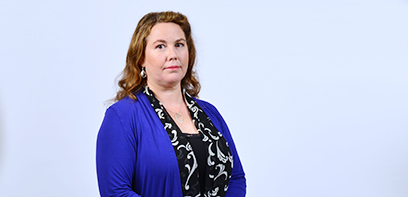Funding: Lloy Wylie advances compassionate care thanks to AMS Phoenix Grant
 Lloy Wylie, PhD, and her team at Schulich Medicine & Dentistry are aiming to advance compassionate care for marginalized populations by creating educational initiatives and providing supports for health care staff.
Lloy Wylie, PhD, and her team at Schulich Medicine & Dentistry are aiming to advance compassionate care for marginalized populations by creating educational initiatives and providing supports for health care staff.
Thanks to a thematic grant from AMS Phoenix, Wylie, assistant professor in the Schulich Interfaculty Program in Public Health, appointed to Psychiatry and Pathology & Laboratory Medicine, will be scaling up this project across Southwestern Ontario, specifically looking at improving equity in health care delivery for underserviced populations including Indigenous, immigrant and refugee communities, and patients with mental illness.
“In general, care providers we interview understand their limitations in working in a trans-cultural context, and want to provide the best care possible,” said Wylie of her previous research funded through an AMS fellowship. “These providers clearly state the need to gain skills in order to support improvements in their services.”
The next phase funded by this latest grant from AMS will involve creating a series of training tools and ways to engage health care providers to give them the skills and supports necessary to ensure they feel confident in providing equitable and compassionate care to all their patients.
Wylie says that many immigrants, refugees and Indigenous people are reluctant to access health care services, and instead use the emergency room as the point of entry once in crisis. “We hope through this project we can create a more welcoming and compassionate hospital experience, so that these underserved populations will be more inclined to access the appropriate care at the right time,” she said. “Ensuring our care providers have the skills that allow th3em to build trust and mutual respect with all patients and families will make our hospitals a more welcoming place.”
At a time when there are new mandates on health equity introduced through Health Quality Ontario and Public Health Ontario, and organizations and institutions are responding to the Calls to Action from the Truth and Reconciliation Commission around Indigenous health, Wylie says the time is right for change.
“This funding is allowing my colleagues and I to take our work to the systems level, at a time when there are new expectations around social accountability. The timing of this funding couldn’t be better to facilitate the convergence of research, policy and practice that take advantage of this window of opportunity for meaningful change,” she said.








